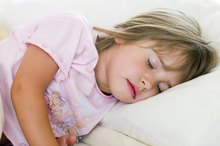What does fact checked mean?
At Healthfully, we strive to deliver objective content that is accurate and up-to-date. Our team periodically reviews articles in order to ensure content quality. The sources cited below consist of evidence from peer-reviewed journals, prominent medical organizations, academic associations, and government data.
The information contained on this site is for informational purposes only, and should not be used as a substitute for the advice of a professional health care provider. Please check with the appropriate physician regarding health questions and concerns. Although we strive to deliver accurate and up-to-date information, no guarantee to that effect is made.
Does Sugar Give Kids Nightmares?
While a certain amount of conventional lore linking sugar to nightmares exists, credible evidence of this effect is difficult to come by. If you or your children have had bad dreams after eating too much sugar, the association may seem natural to you. However, sugar itself exerts no known direct effect on dreams. Eating too much of it may affect other conditions, such as hypoglycemia, which can influence dreams.
If you are experiencing serious medical symptoms, seek emergency treatment immediately.
Studies of Food and Nightmares
A 2000 article in the "Journal of the Mind and Body" cites several studies which attempted to determine the relationship between eating before bed and dreams. Several of the studies indicated that eating and overeating before bed may increase brain wave activity, and that this heightened activity could increase the vividness of dreams, including nightmares. The article places some emphasis on the effect unhealthy foods may have, but does not indicate sugar alone as a primary cause of bad dreams.
- A 2000 article in the "Journal of the Mind and Body" cites several studies which attempted to determine the relationship between eating before bed and dreams.
- Several of the studies indicated that eating and overeating before bed may increase brain wave activity, and that this heightened activity could increase the vividness of dreams, including nightmares.
Other Chemicals in Candy and Junk Food
Behavioral Signs of Low Blood Sugar
Learn More
Other chemicals may influence your dreams. For example, nicotine patches are sometimes packaged with a warning to the effect that they may cause vivid or unusual dreams. While junk food does not contain nicotine, it may have other ingredients that have similar effects. Candy and sweets with chocolate in them will contain both theobromine and caffeine. These chemicals may disrupt sleep in sufficient quantities, and such a disruption could lead to nightmares.
- Other chemicals may influence your dreams.
- For example, nicotine patches are sometimes packaged with a warning to the effect that they may cause vivid or unusual dreams.
External Sensations During Sleep
You may be familiar with the occasional effect external influences can have on dreams. If a telephone rings, for example, someone sleeping nearby may dream of a telephone ringing. If a clock radio is on, this may cause dreams about the music it plays. Sugary foods can conceivably have a similar influence on dreams, by causing one or more physical sensations, and a dreaming child may be vaguely aware of these feelings while sleeping. For instance, the child may experience stimulant properties from sugar. His unconscious mind may then interpret the stimulation as physical exertion or excitement within his dreams. Indigestion, which may cause esophageal pain or an upset stomach, may also lead to dreams in which the pain is felt and interpreted by the unconscious mind. Not every child experiences these physical effects from junk food, and those who do may not necessary have bad dreams, so the extent to which sugar's physical influence on the body translates to bad dreams varies from child to child.
- You may be familiar with the occasional effect external influences can have on dreams.
- Sugary foods can conceivably have a similar influence on dreams, by causing one or more physical sensations, and a dreaming child may be vaguely aware of these feelings while sleeping.
Blood Sugar and Dreaming
How Diet Affects Children's Behavior
Learn More
According to MayoClinic.com, a child's blood sugar level may influence her dreams. When her blood sugar becomes low during sleep, a condition known as diabetic hypoglycemia can occur 2. Some of the signs and symptoms of diabetic hypoglycemia include nightmares, perspiration and fatigue upon waking up 2. Other aspects of diabetes such as the so-called "dawn effect" account for an unexplained rise in blood sugar levels during the early morning, which may also influence a child's dreams. Diabetes can have serious effects on the health of your child. So, if she does exhibit these symptoms and you cannot isolate a dietary cause, you should consult a medical professional about the possibility of diabetes.
- According to MayoClinic.com, a child's blood sugar level may influence her dreams.
- Other aspects of diabetes such as the so-called "dawn effect" account for an unexplained rise in blood sugar levels during the early morning, which may also influence a child's dreams.
Related Articles
References
- MayoClinic.com: The 'Dawn Phenomenon': What Causes It?
- MayoClinic.com: Diabetic Hypoglycemia
- Agency for Healthcare Research and Quality: Treating Tobacco Use and Dependence: 2008
- Domhoff GW, Fox KC. Dreaming and the default network: A review, synthesis, and counterintuitive research proposal. Conscious Cogn. 2015;33:342-53. doi:10.1016/j.concog.2015.01.019
- Schneider JA. From Freud's dream-work to Bion's work of dreaming: The changing conception of dreaming in psychoanalytic theory. Int J Psychoanal. 2010;91(3):521-40. doi:10.1111/j.1745-8315.2010.00263.x
- Jung, CJ. Four Archetypes. Routledge; 2014.
- Hall, CS. A cognitive theory of dreams. J Gen Psychol. 1953;49(2):273-282. doi:10.1080/00221309.1953.9710091
- Domhoff, GW. A new neurocognitive theory of dreams. Dreaming. 2001;11(1):13-33. doi:10.1023/A:1009464416649
- Cartwright RD, Kaszniak A. The Social Psychology of Dream Reporting. In Ellman SJ, Antrobus JS, eds.: The Mind in Sleep: Psychology and psychophysiology, 2nd ed. Wiley, 1991.
- Morewedge CK, Norton MI. When dreaming is believing: The (motivated) interpretation of dreams. J Pers Soc Psychol. 2009;96(2):249-64. doi:10.1037/a0013264
- Domhoff GW. Finding Meaning in Dreams: A Quantitative Approach. Springer Science and Business Media, 1996.
- Domhoff GW. Toward a Neurocognitive Model of Dreams. In: The Scientific Study of Dreams: Neural Networks, Cognitive Development, and Content Analysis. American Psychological Association, 2003.
- Freud S. The Interpretation of Dreams. 1900.
- Jung C. The Practical Use of Dream-analysis. In: The Practice of Psychotherapy: Essays on the Psychology of Transference. 1966.
Writer Bio
Rob Callahan lives in Minneapolis, where he covers style, culture and the arts for Vita.MN and "l'étoile Magazine." His work has earned awards in the fields of journalism, social media and the arts. Callahan graduated from Saint Cloud State University in 2001 with a Bachelor's degree in philosophy.









